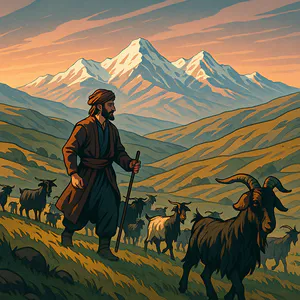Generate Kurdish names
More Real Name Generators- <% result.name %>
Discover all Story Shack apps
Discover the Essence of Kurdish Identity
Crafting a meaningful name can deeply connect your character to their Kurdish roots. Use these thought-provoking questions to inspire unique and resonant names that reflect cultural heritage, history, and personal significance.
- What historical figures or cultural icons do you admire, and how can their names inspire your character?
- What aspects of your character's personality should the name convey, such as strength, wisdom, or compassion?
- How does your character’s environment shape their identity, and what elements of nature or geography could influence their name?
- What traditional Kurdish values or stories resonate with your character's journey, and how can these be reflected in their name?
- What dreams or aspirations does your character hold that could be symbolized through their name?
Frequently Asked Questions
Here are some common inquiries about the Kurdish Name Generator and how it can illuminate your character creation process.
How does the Kurdish Name Generator work?
It randomly combines elements from Kurdish culture, history, and language to create unique names tailored for your character with each click.
Can I choose a specific cultural background for the names generated?
Currently, the generator does not accept specific inputs, but you can keep generating names until one resonates with your vision.
Are the names unique to each generation?
The generated names are unique each time, allowing for a diverse range of options; however, some may share similarities due to cultural roots.
How many names can I generate?
You can generate an unlimited number of names; simply click to refresh and discover new options as often as you like.
How do I save my favorite names?
You can easily copy a generated name by clicking on it, or you can save it for later by clicking the heart icon.
What are good Kurdish names?
There's thousands of random Kurdish names in this generator. Here are some samples to start:
- Ciwannaz Ardelan
- Yekbon Barî
- Asus Serfiraz
- Baz Beşat
- Nasîko Serxwebun
- Şelal Behwan
- Nûşîn Kosret
- Tenya Xogir
- Dilber Ciwanê
- Awat Bijîn
About the creator
All idea generators and writing tools on The Story Shack are carefully crafted by storyteller and developer Martin Hooijmans. During the day I work on tech solutions. In my free hours I love diving into stories, be it reading, writing, gaming, roleplaying, you name it, I probably enjoy it. The Story Shack is my way of giving back to the global storytelling community. It's a huge creative outlet where I love bringing my ideas to life. Thanks for coming by, and if you enjoyed this tool, make sure you check out a few more!























































